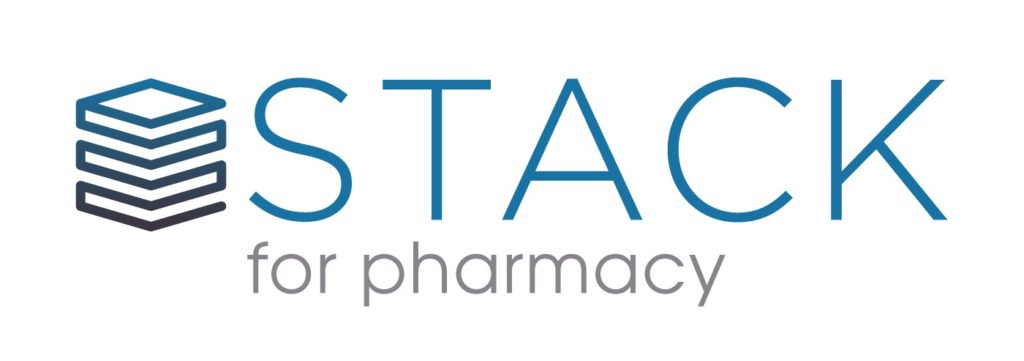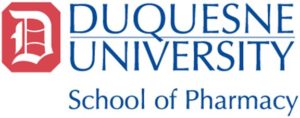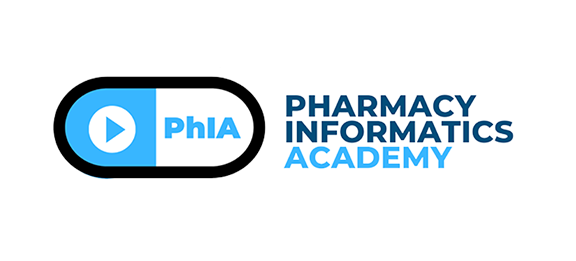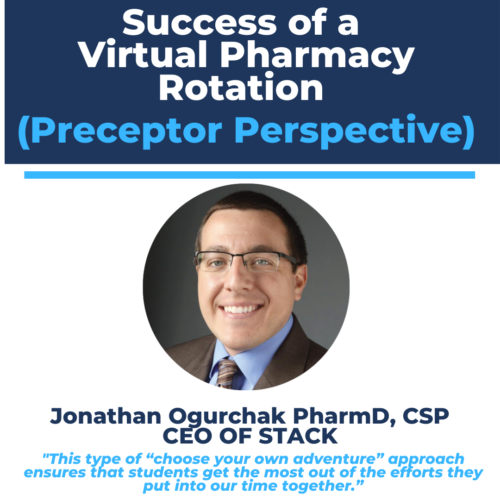Success of a Virtual Pharmacy Rotation (ft. Jonathan Ogurchak – Preceptor Perspective)
“Thanks to your team at the Pharmacy Informatics Academy with the preceptor availability grid. I’ve been able to enroll students at 7 schools of pharmacy in the last few weeks. The virtual nature of the rotation allows for greater flexibility both in regard to timing on a daily basis, but also to the content that’s provided. This type of “choose your own adventure” approach ensures that students get the most out of the efforts they put into our time together.” – Jonathan Ogurchak, CEO of STACK
Our day-to-day lives have turned upside down due to COVID-19. We are no stranger to disruption in the world of pharmacy. This includes pharmacy students. Students set their rotation schedules a year in advance with your School of Pharmacy. They have studied and worked hard for 6+ years to get to their Advanced Pharmacy Practice Rotations (APPEs). Working under the supervision of an experienced pharmacy preceptor, APPEs are enhanced learning environments where students are able to apply their knowledge in a practical setting. It is an environment where you are able to find your strengths and weaknesses and what you could imagine yourself doing as a career. In addition, you are able to enhance your network, get an understanding of different healthcare models, etc.
A virtual pharmacy rotation has the ability to broaden your experiences. For instance, Yasmin Moatazedi from Marshall B. Ketchum University had completed a virtual pharmacy rotation with Dr. Jonathan Ogurchak, CEO of STACK – a pharmacy software platform. From the rewarding experience of this rotation, Yasmin and Dr. Ogurchak had their article recently published online in Pharmacy Times. See their article here.
In this post, the Pharmacy Informatics Academy interviews Dr. Jonathan Ogurchak about STACK, his pharmacy rotation, and virtual rotations.

Tell us about yourself, background, and your company.
I’m a 2009 graduate of the Duquesne University School of Pharmacy in Pittsburgh. I have been involved in specialty pharmacy for almost all of my career. I worked for both large corporate and small, independent specialty pharmacies and have touched all aspects of operations. I primarily was involved on the technology side, such as building dosing algorithms and clinical programs, all the way up to patient management software. I sold my equity at the specialty pharmacy I co-owned a little over 2 years ago to spend more time with family, and continued teaching Specialty Pharmacy programs for several universities (and as introductions to others in the industry who weren’t aware of this niche area).

I founded STACK about a year ago, based on the struggles that I saw running a pharmacy firsthand. We’d invest in people to handle all of the elements of the business “outside of the fill” – and to me, it seemed like this could be something easily automated. STACK is a software platform designed to provide pharmacies with a framework of how to manage things like licensure, contracts, accreditations, and personnel files by organizing business assets in a usable, searchable fashion. Although we started with a focus on specialty, we have expanded to support every aspect of pharmacy – community, hospital, home infusion, and more!
Tell us about the student pharmacy rotation that you provide.
I meet virtually with the students several times per week and have several topic areas focused around specialty pharmacy, technology, and entrepreneurship that we make sure to cover during the course of the rotation block. But I really approach the virtual nature of the rotation as a way to tailor the experience for each student. If there are topics they want to learn more about, we’ll build discussions around them. This allows for a very collaborative atmosphere between both the students and I, especially since my students come from areas all over the country.
Outside of discussions, we handle projects similarly. Every school is a bit different with how they approach non-patient electives in regard to projects; however, I make sure that students produce work that will both reflect their capabilities, and have some meaningful, lasting purpose behind it. Students have written articles for publication in Specialty Pharmacy Times, built continuing education programs, produced surveys for national publications and much more!
Check back soon on Yasmin’s interview from a Student’s Perspective!
Check out the Virtual Rotation Database if you are interested in becoming a preceptor!


